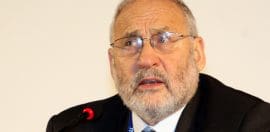Is that just the way it is?

22 April 2021 at 8:46 am
The successful prosecution of a police officer in the George Floyd murder trial shows how radical change can occur in the fight against ingrained discrimination, writes David Crosbie, who says our own reckoning in Australia is yet to come.
Under the US Civil Rights Act of 1964, segregation on the grounds of race, religion or national origin was banned at all places of public accommodation, including courthouses, parks, restaurants, theatres, sports arenas and hotels. Bruce Hornsby – the piano playing singer-songwriter addressed the limitations of this law and our ongoing acceptance of the unacceptable in his song The Way It Is.
Standing in line, marking time
Waiting for the welfare dime
‘Cause they can’t buy a job
The man in the silk suit hurries by
As he catches the poor old ladies’ eyes
Just for fun he says, “get a job”That’s just the way it is
Some things will never change
That’s just the way it is
Ah, but don’t you believe them….Well, they passed a law in ’64
To give those who ain’t got a little more
But it only goes so far
Because the law don’t change another’s mind
When all it sees at the hiring time
Is the line on the colour bar, no, no
There are many times in my life when I have been told “that’s just the way it is”. It can be good advice. I have sometimes found myself offering the same words to family and friends, and those I have worked with. The implications embedded in this theme are clear; time to accept it, work around it, take a different direction, it is what it is, don’t waste your time and energy, it’s not going to change.
And yet change does happen, even to ingrained discrimination, although usually not to the timetable we might desire.
The three virtues at the heart of Christian theology are faith, hope and charity. The capacity to hope for a better world, to believe a better world is possible, and to work towards that change has resonance within a number of theologies. Faith, hope and charity are not just virtues, they are the drivers of change, an antidote to “that’s just the way it is”.
When I talk to charities, I am constantly reminded that at the heart of so much of our work is believing things can be better, for individuals, families, communities, countries, for our world. Without that sense of belief and hope, where would charities be?
In the US this week we have seen change despite the long practiced “that’s just the way it is” paradigm that Minneapolis police cannot be successfully prosecuted for criminal policing behaviour. A rogue police officer has been held to account by his peers, his department, and his community. In so many of the discussions about the shocking murder of George Floyd, the framing of the discourse has been around the way policing is done to a community rather than with a community. This stand and deliver approach always rings alarm bells for those of us familiar with policing and criminal justice systems.
Our own reckoning in Australia is yet to come.
Since the Royal Commission into Aboriginal Deaths in Custody report was released thirty years ago incarceration rates of Indigenous people have increased from 14 per cent to 30 per cent of the Australian prison population.
We know we would reduce Indigenous deaths in custody if a lot less Indigenous people were in prison. This is not hard to achieve. Diversion programs for people with mental health or drug dependence have been part of our justice system for many years and are expanding, yet there is little serious investment in reducing the number of Indigenous people jailed – often for minor non-violent crimes.
The Maranguka Project in Bourke has achieved 20 per cent less domestic violence incidents recorded by police, a 30 per cent increase in Year 12 student retention, 40 per cent fewer charges across the top 5 juvenile offence categories, and $3 million saved across the 3-year project (2015–2017).
Maranguka is not just about the Bourke community, including several charities, working together to achieve the shared goal of reducing incarceration rates, it is about using information to empower Indigenous communities to drive the change they want to see.
The people of Bourke practiced hope for a better way.
We know that Indigenous empowerment, diversion programs, post prison release support, adequate legal representation, supported education, employment and recreation programs, and circle sentencing where Indigenous people have direct input in hearing charges and determining sentences (successful in Canada) are all important and effective programs that can change what we have not changed in more than 30 years.
CCA supports the Uluru Statement from Heart because we want to address Indigenous disadvantage (we need to address the rampant inequality experienced by Indigenous people), but also because we believe Australia can only really grow as a nation if we are prepared to embrace our past and the teachings of a culture that has existed in our country for over 40,000 years.
Thousands of Indigenous people practiced hope in developing the Uluru Statement from Heart.
We know what we need to do, we could do it if we wanted to, why are we not doing it?
Perhaps too many of us are following what our government chose to do in response to the Uluru Statement from the Heart – not listen.
“There’s really no such thing as the ‘voiceless’. There are only the deliberately silenced, or the preferably unheard.” – Arundhati Roy
Why do we keep expecting a marginalised 3 per cent of the population to drive change for the other 97 per cent?
Is that really just the way it is?







